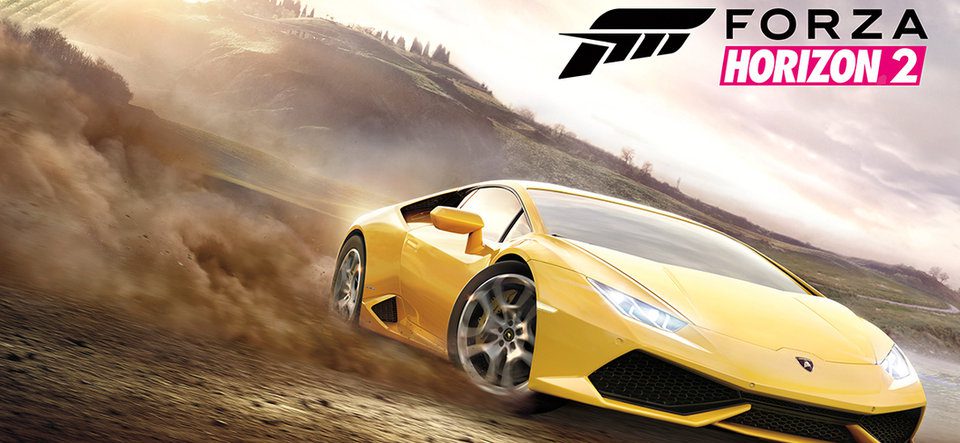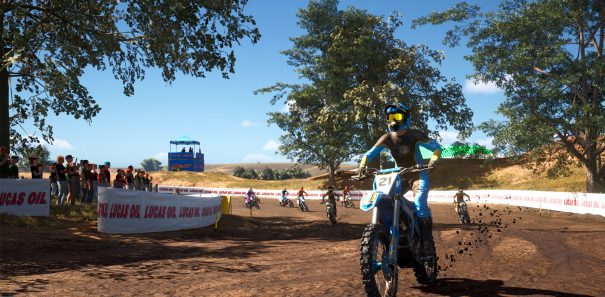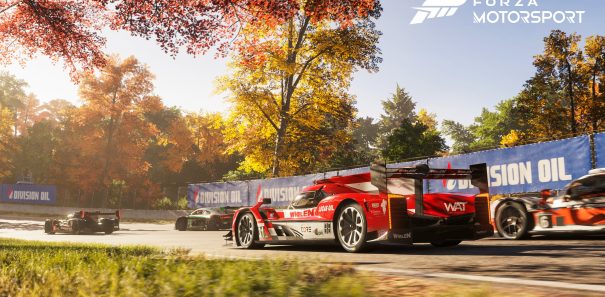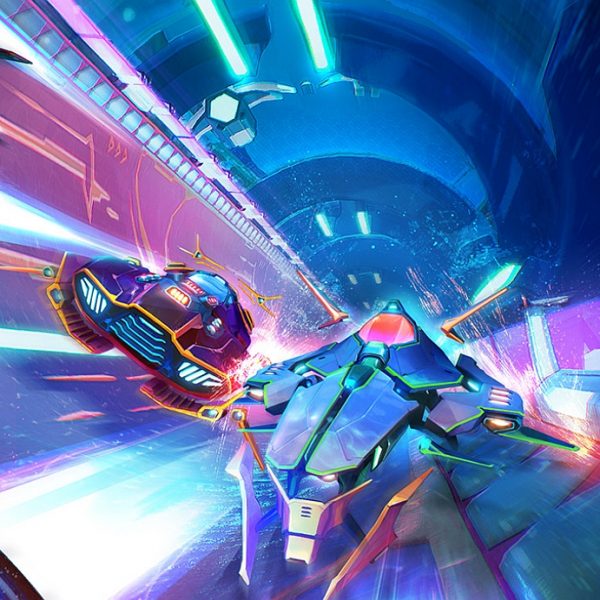Though the first Forza Horizon game was met with critical acclaim upon its release two years ago (we gave it a lofty 9/10 rating in our official review), it wasn’t – in this writer’s opinion – quite as impressive as the game’s reception alluded to.
For sure, it was a mighty technical achievement, and the racing itself was varied and generally entertaining, but the whole execution felt relatively ‘one note’ in comparison. Which was a shame, given an open-world racing game in this mould had the potential to be truly outstanding.
So, it’s here where Forza Horizon 2 comes in. With swathes of critical and commercial feedback and all-new hardware to spawn a sequel with, developer Playground Games aims to build upon everything the original did right, whilst addressing all the negative points that held it back from being an all-time great open-world racer.
And, for the most part, Forza Horizon 2 does prove itself to be an esteemed standard bearer for this sub-genre of driving games. That said, it does seem another sequel is needed to iron out the final few blemishes that still plague FH2’s otherwise thoroughly well-executed formula.
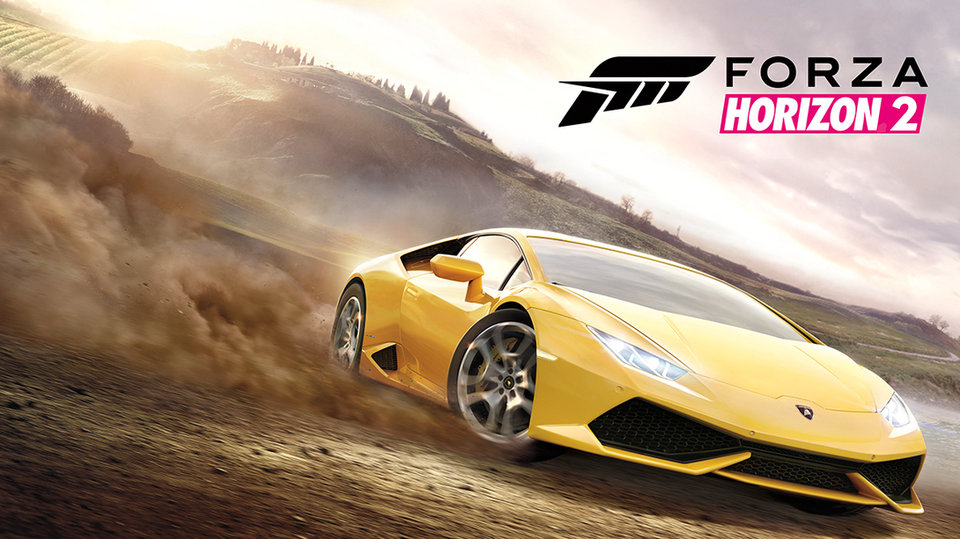
In the Search of Driving Heaven
In this tester’s opinion, the original Horizon’s setting of Colorado wasn’t quite as impressive as some made it out to be back in 2012. Whilst there’s no denying the level of detail was astonishing for an open world racing game at the time, a strong case can be made that the playable area was quite restrictive in terms of overall size.
After all, when Eden Games could cram two entire islands into Test Drive Unlimited 2, it’s a slight shame to see such a ‘clean slate’ racer possess a disappointingly tiny environment to actually explore; even more so when you factor in the inability to actually drive beyond the confines of the road network.
Thankfully, this seems to be an area that developer Playground Games had fairly high up on the “Must Improve Next Time” suggestions list, as there’s now a far more vast and varied expanse of land to traverse in Horizon 2. Instead of a Southern Rocky skybox, we now have a sun-kissed stretch of land straddling the Franco-Italian border, complete with broad autostradas and marina complexes, to tight city streets and off-camber country roads.
Whilst it might not feel quite as large as the “three times bigger than the original Horizon” claim (even in something as humble as a Land Rover Defender, it doesn’t take particularly long to drive from one end of the map to the other), it is still a nicely realised open world that, if anything, certainly nails the look and feel of a Mediterranean locale. Being able to view such a breathtakingly beautiful part of the world in a variety of meteorological and time-of-day conditions is also a much-welcome feature that, even after 20+ hours of gameplay, still hasn’t lost its novelty factor.
If there’s one complaint to be had with the map’s size, however, it’s that it doesn’t particularly lend itself well to adventurous and complex route layouts and designs. Given the part of the world that Horizon 2’s set in is home to some of Europe’s greatest driving roads (whether they be the fabled Route Napoleon or the twisting, picturesque country lanes), it’s a shame that – in a game that claims to celebrate car culture – there are only a handful of decently-sized stretches of tarmac available to really stretch an auto’s legs on.
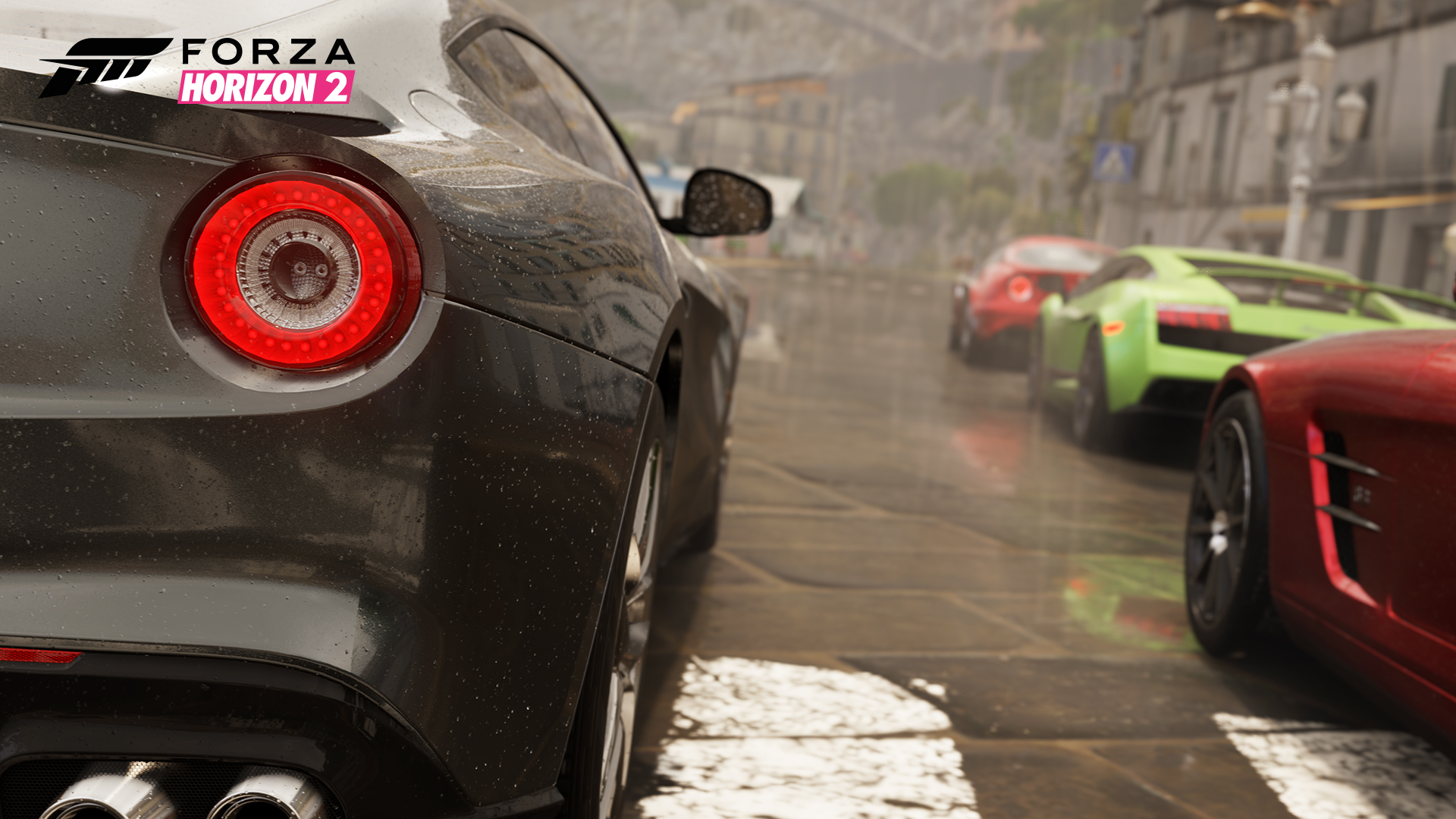
Driving Rain
What does save the mildly disappointing road design from being even more discouraging, however, is Horizon 2’s excellently balanced physics engine. Despite being based on the impressive running gear that underpinned last year’s Forza Motorsport 5, FH2 has no pretentions of being a serious, po-faced simulator, and it’s all the better for it.
Though this isn’t a new or particularly revolutionary concept (the original Horizon, after all, did the same thing to Forza Motorsport 4’s chassis setup), what makes the whole formula work so much more effectively this time around is that there’s actually a decent amount of depth to the physics. An accurate-to-real-life racer this game may not be, but there’s enough realism and authenticity here that makes the title’s 200+ cars certainly feel like the versions you read about in car magazines or watch being pushed to the limit by a certain Tame Racing Driver.
Whilst there are still areas where – through either technical limitations of the demands of the target demographic – the rougher edges have been ironed out (driving a Lamborghini Huracan through a vineyard at 100mph+ is probably a lot harder to do in real life than in Horizon 2…), it’s still a joy to wrestle with these cars right on the raggedy edge, regardless of preferences when it comes to driver assists.
This heightened at its peak when you swap the bone dry asphalt for something with far less adhesion to play with. What were once far more controllable and docile creatures on the open road now become far less forgiving when you take liberties with them on dirt trails or the brand-new-to-Forza wet weather effects. Contrary to what a handful of other critics have discussed, there is a considerable difference to the way everything handles when the weather makes a turn for the worst.
Cars which were once neutral and inviting in the dry suddenly feel far more skittish and nervous when the Heavens open up, and all of a sudden those slow sweepers become notable hurdles to overcome in the more powerful rear-wheel drive motors. As a result, when you are able to man handle that Ferrari F12 or TVR Sagaris in the rain without dinging into the traffic or roadside scenery, it’s all that much more rewarding, and one can only imagine how challenging and fulfilling such a scenario could be in a fully-fledged Forza Motorsport game.
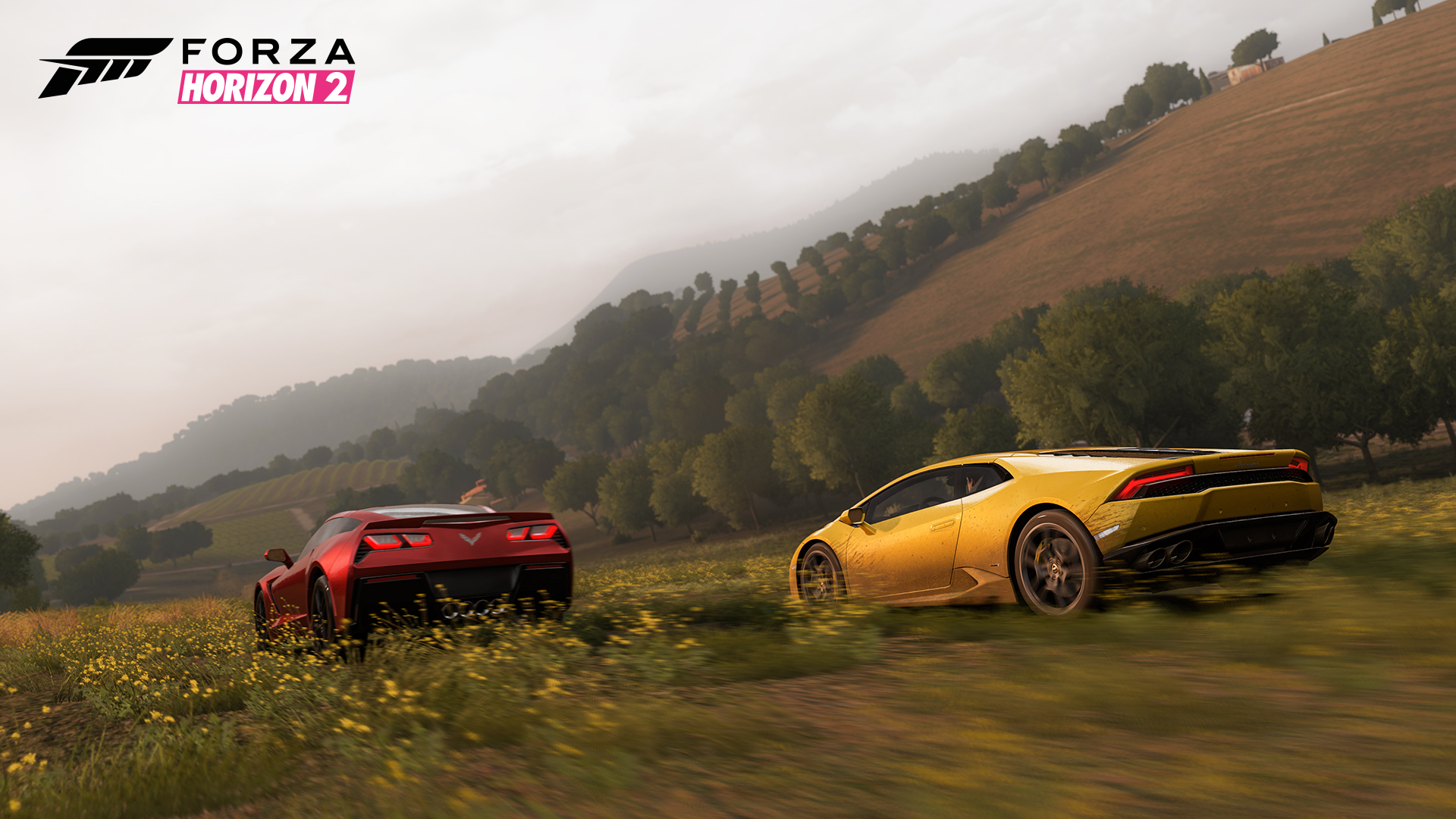
Missing The Beat
It’s this juicy pliancy to the handling simulation that really makes up for what is Horizon 2’s potentially most prominent long-term drawback: a lack of diversity in the game’s event structure.
Whilst there’s nothing fundamentally wrong initially, the game does seem to be out of ideas once you’ve completed the first 15 championships and the inaugural Horizon Finale. There are some highlights along the way (hurtling through the Italian countryside in one of the Extreme Off-Roader championship events is as ludicrous as it is exhilarating, especially with Vivaldi’s Concerto No. 2 accompanying the roar of those feral race-bred engines), but, with 112 races in each of the game’s six regions, things do start feeling increasingly repetitive after a while.
Remedies to Horizon 2’s increasingly sterile selection of circuit and sprint races are available to make up for the game’s limited repertoire, with the all-new ‘Bucket List’ challenges and returning ‘Showcase’ events mixing things up away from the Festival Hubs that form the portals for the championships. Disappointingly, however, they still lack the ability to spice things up by a considerable margin, either by suffering the same fate of the core singe player modes or by not lasting long enough to make much of a meaningful impact.
Still, even with the cut-and-paste career mode, it would perhaps be too harsh to criticise Horizon 2 for offering too much to do – as expected from a game retailing for almost £50, there’s plenty available to justify the financial outlay, even before you dig into the multiplayer component’s online road trips, co-op challenges, competition between rival car clubs, head-to-head showdowns and staple of game modes that have been featured in countless Forza games.
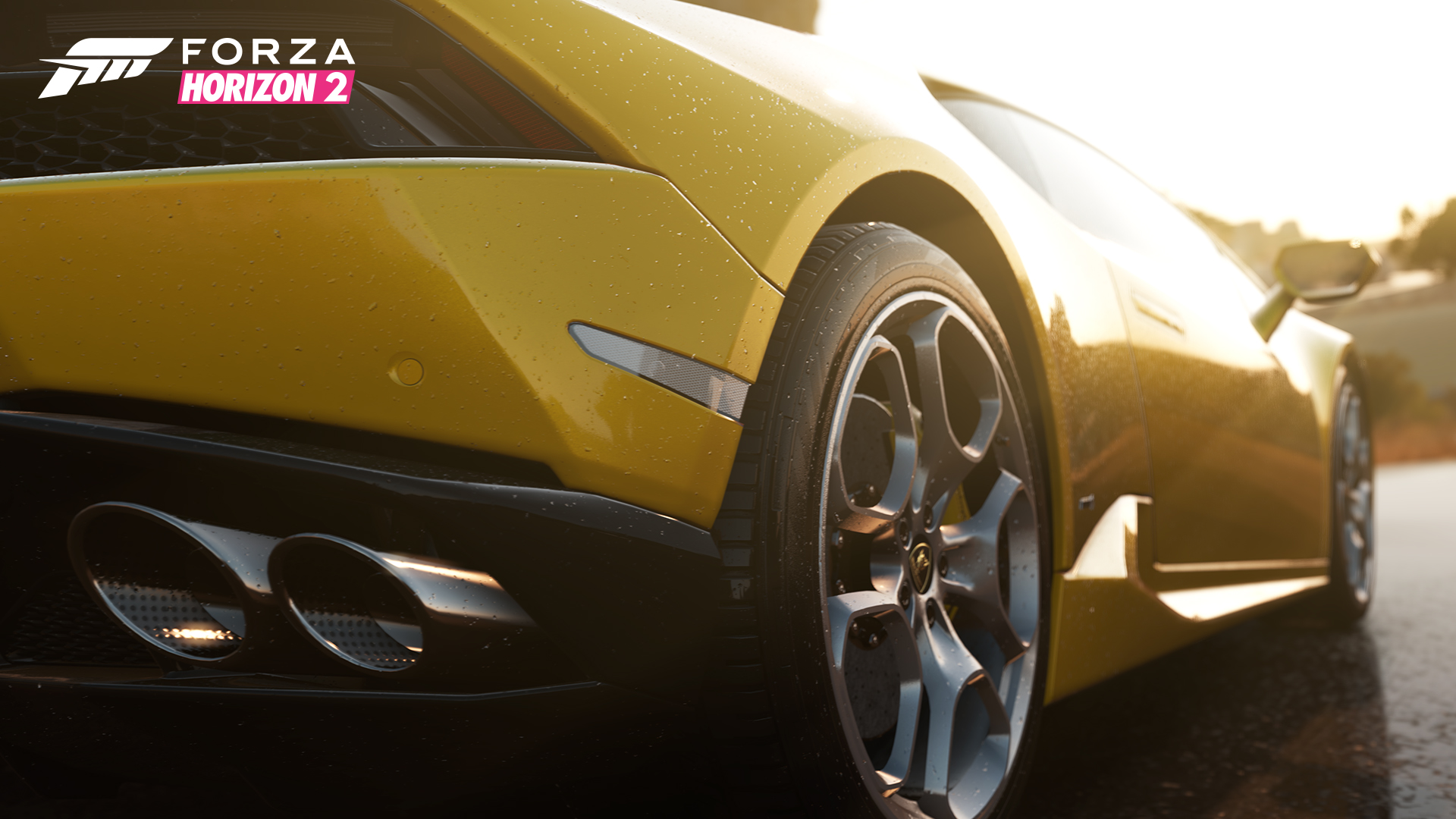
Now, Bring Me That Horizon
What really helps Horizon 2 rise above the contemporary competition, however, is being the first ever Forza game that encourages you to release your inner green-laner. Unlike the original Horizon, which came across at times in a similar (though nowhere near as arcade) vein to Need for Speed Rivals and Burnout: Paradise, it seems FH2 took quite heavy inspiration from the Test Drive Unlimited franchise’s defining mantra: bar a few immovable barriers and sneakily placed invisible walls, there’s nothing stopping you from driving anywhere within the perimeter of the playable territory
Such a vast expanse of land wouldn’t mean much if there wasn’t any worthwhile incentive to actually explore it, however, and there’s thankfully a good few reasons to venture through this territory at your disposal. Beyond the experience points reward for driving down every road in the game, there’s also Playground Games’s design decision to hide most of the location icons from the map – whether they be for car meets, destructible reward boards or speed traps zones – until the player has travelled there first.
As a result, it uses that subtle (for want of a better word) trick used in many open-world games to encourage you to visit uncharted territory, with the lure of discovery drawing you in as if every forested area or hilltop has an extremely well hidden barn find car located somewhere within or nearby.
Likewise, this perceived freedom also forms quite a crucial bedrock for the whole Horizon Festival premise. Not only is the rather forced ‘down-with-the-kids’ vibe from the first Horizon considerably toned down this time around, but the way in which you can wrap up the game’s multitude of championships also doesn’t direct you down a narrow and restrictive path. There are no Performance Index ratings to adhere to this time around, and – as long as the car in question is in the same category – you can swap vehicles in between championship events if you’d, for example, rather use your all-wheel drive Lancia Delta S4 in a predominantly dirt trail race instead of the rear-wheel drive Ford RS200 you’re currently driving.
Upon being crowned the Horizon Champion, the ability to choose which of the six locations to race at is also made available, further giving the player the option to complete the game in a way that best accommodates their personal preference.
This newfound accessibility, however, does come at a cost to some of Horizon 2’s mechanics that have been carried over from the previous game. For instance, whilst the wristband set-up is still retained, there’s far less need for it this time around, especially as they’re not used to unlock any new event types for you to participate in (as was the case in the original Horizon). Other than being superfluous bookends for experience points boundaries, there really is no need for them in FH2, and it’s bizarre that Playground Games has decided to retain a feature without actually having a credible use for it.
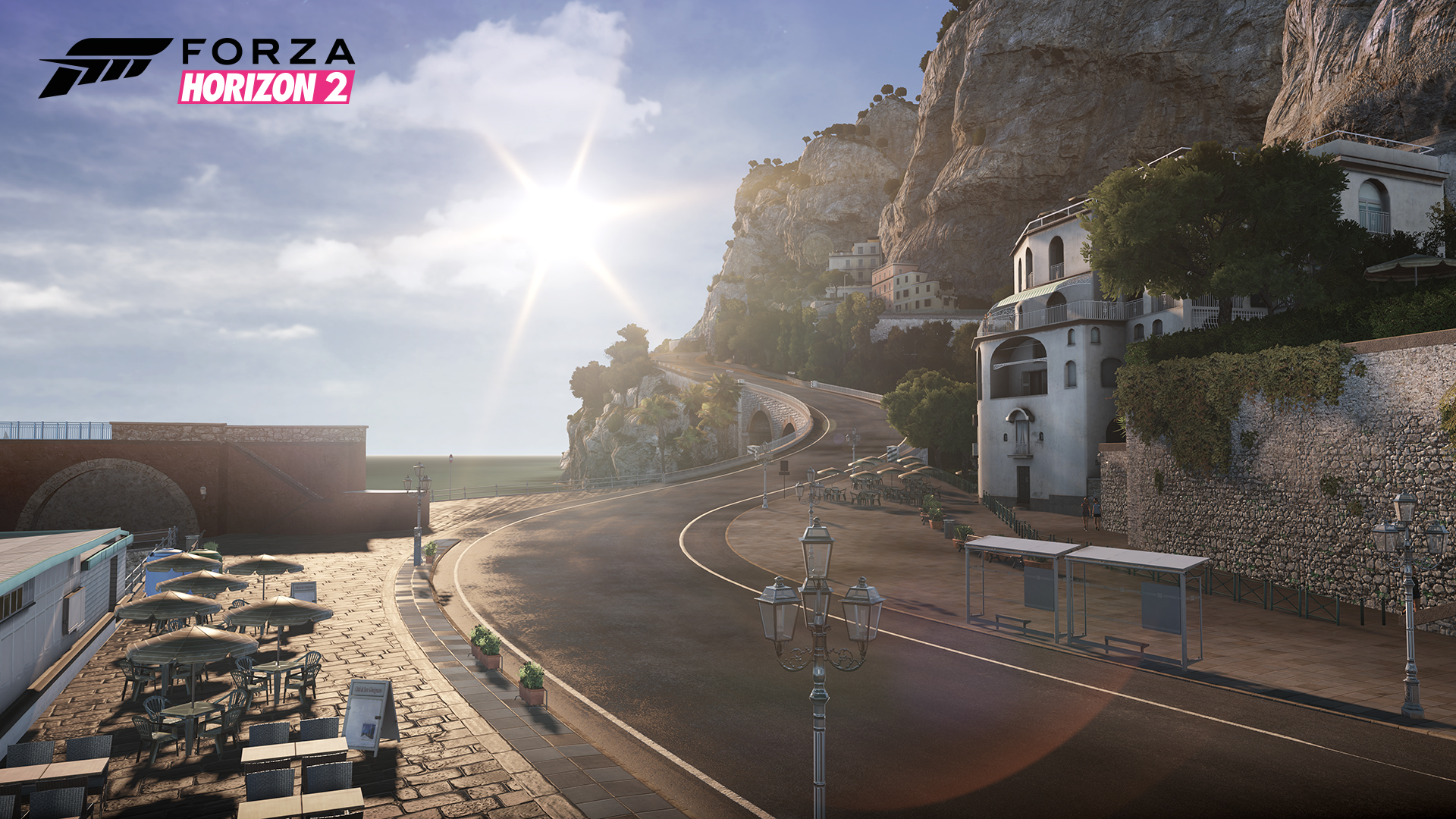
Fit And Finish
With hardly any of the marketing material for Forza Horizon 2 being dedicated to the Sumo Digital-developed Xbox 360 port, it’s pretty clear that Microsoft intended this game to be a major system seller for the Xbox One. As a result, it seems suitable to see just how good a Horizon game can fare on a games console that’s considerably more powerful than the one the sub-franchise debuted on.
And, on the whole, it’s pretty easy to see the extra processing power has done wonders to Horizon 2 on a technical level. Though it’s a slight shame the 60fps frame rate from Forza Motorsport 5 hasn’t been carried over, the same 1080p resolution remains and – as a result of Playground Games’s focus on stability over peak performance bragging rights – the 30fps remains resolutely locked at that, no matter how much carnage is occurring on the screen.
A similar story can be said for Horizon 2’s other reheated leftover from FH5: the controversial, cloud-powered Drivatar system that, in last year’s Forza Motorsport, seemingly replaced traditional AI coding with driver data sourced from Jason Plato. However, whilst the Drivatar competition may at times still be overtly and frustratingly aggressive, their outright rage seems to have been considerably toned down without compromising the more ‘human’ driving behaviour. As a result, surprisingly engaging tussles that last for entire races are more frequent than you might have expected, and it’s a clear indication that – with an extra year of data gathering under its belt – the Drivatar system has the potential to be a highly valuable asset to the Forza franchise.
In other areas, though, Horizon 2 does lack the outright polish that you may expect from a game that’s meant to justify an upgrade to expensive new gaming hardware. Though there’s no denying the lighting and audio effects are potentially at the pinnacle of what can be achieved in a racing title, the finer features (like the choppy shading detail and poor wet weather particle effects) do put a dampener on the whole experience.
Then again, there is little else to criticise Forza Horizon 2 for on a graphical level, and it’s possible the only reason these visual inconsistencies are as prominent as they are because the rest of the game is such a gorgeous delight to behold.
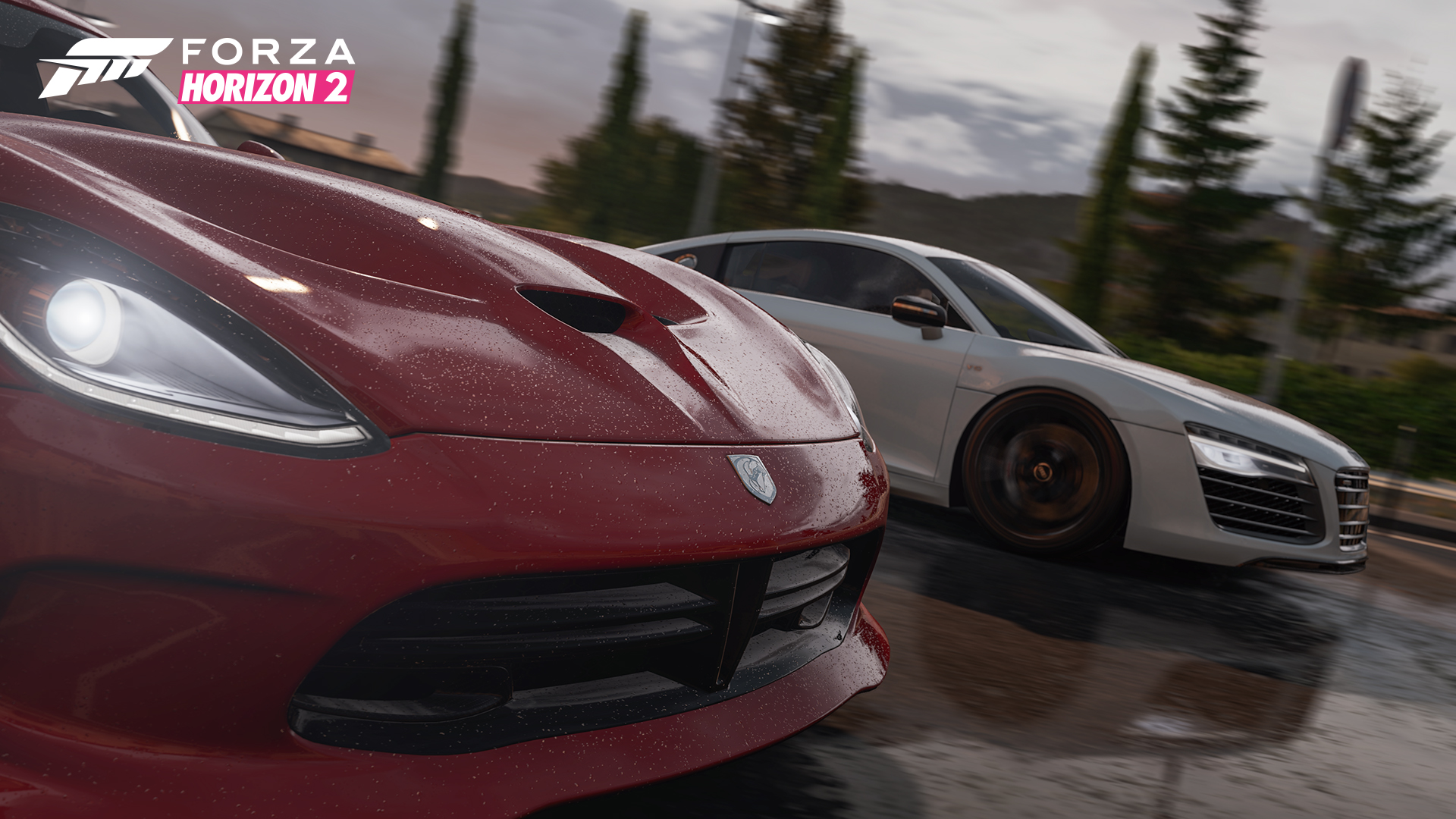
Green (Or Is That Brown?) With Envy
Perhaps my biggest quibbles with Forza Horizon 2, however, are due to developer Playground Games’s chosen colour palette. Whilst it may appear to be a trivial issue, it affected me more profoundly than I expected it to during my time testing the title.
As showcased in the provided image (sourced from this Tweet by game accessibility consultant Ian Hamilton), the colours used to depict the checkpoint markers and racing line are hard to distinguish for players – like myself – who are red/green colourblind.
In particular, the decision to revert the racing line colourscheme back to green-to-red hues (instead of sticking with the blue-to-red set up found in Forza Motorsport 5) is one that I’d imagine would give deuteranopic players the biggest headache of all, especially in the game’s off-road races. It’s easy enough to lose your bearings in those events anyway, let alone when such a crucial navigational aid in a racing game without tools such as brake markers is hidden in the undergrowth…
Given I’ve written extensively about this subject before on Team VVV, I shan’t divulge more words to this issue that haven’t already been said elsewhere. Given this is – in my humble opinion – an area I thought had been rectified in the Forza franchise, it’s disappointing for me to discuss something that’s so simple to find a solution for again.
Conclusion
During one of the many road trip voice over segments, the Horizon festival organiser declares (to words of this effect) the destination isn’t what really matters here: it’s the journey that we should all be savouring and enjoying.
In a way, that very sentiment can be used to sum up Forza Horizon 2 as a whole. Burn through all the events as quickly as possible (as I did during my first playthrough), and the game will most likely leave you feeling dissatisfied.
Take it at a slower pace, however, and the charm of FH2 really does start to shine through. Whether you’re scouting for that ever-elusive barn find, cruising down the coastal causeway between Nice and Castelleto, or simply parking on top of a hill and watching the storm clouds slowly roll into view, there’s an inherent beauty to sitting back and drinking in all the details and experiences this game has to offer.
Is FH2 perfect? Of course not. To this reviewer’s eyes, there are still a few glaring faults – the déjà vu event structure being perhaps the most worrisome of the lot – that hold it back from being truly outstanding. But they don’t stop Forza Horizon 2 being a staggeringly good open world driving game, and quite possibly 2014’s best racing title so far.
(This review of Forza Horizon 2 was carried out on the Xbox One with a “Day One Edition” retail copy of the game.)


